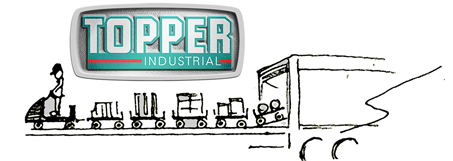Fork Truck Free (FTF) reduces the quality errors in a manufacturing facility. Zero Defects is a management tool aimed at the reduction of defects through prevention. It is directed at motivating people to prevent mistakes by developing a constant, conscious desire to do their job right the first time.
Fork Truck Free bolster the definition of quality: conformance to requirements. To tackle quality-related problems, there must be widespread agreement regarding specific quality definition for a particular product. Customer needs and expectations must be reduced to measurable quantities like length, or smoothness, or roundness and a standard must be specified for each. These become the requirements for a product and the organization must inspect, or measure what comes out of the production process against those standards to determine whether the product conforms to those requirements.
Unlike the status quo with multiple back and forth fork truck trips, cart deliver provides a constant conscious effort to guarantee zero defects. Examining the production process for steps where defects can occur and mistake proofing them contributes to defect-free production.
To resolve issues of poor quality, costs associated with poor quality must be measured in monetary terms. The price of nonconformance is preferred versus the cost of quality; this paradigm shift overcomes the misimpression that higher quality requires higher costs. The price of conformance includes quality-related planning, inspection, and auditing; the price of nonconformance includes scrap, rework, claims against warranty, unplanned service.
While the trend in the materials handling sector, including heavy duty manufacturing, is toward automation, manual movement can still be a best practice for some operations. Lean operations have the same goal: Invest less capital and come up with simpler solutions and delivery carts bring material flow to lean manufacturing.
Delivery carts with rotating decks can be individually equipped with stainless steel uppers, like pop-up shelves, to allow more parts to be moved on the cart. The horizontal shelves are stocked with parts and delivered to the workstation in the right sequence. As the operator selects parts from the shelf, the deck can be rotated to allow quick and easy access, without excessive reaching. When the operator has unloaded the top shelf, the shelf springs up into a vertical position so the operator can access the stock on the next shelf.
Quality is improved versus the status quo because operator on the line does not have to do anything other than the operation, meaning no searching for parts, making decisions about the right tools to use, or unpacking parts and removing packaging materials from the workstation. And, if a big plant wants to change a line, a cart is quickly and easily moved without compromising quality.
Moving from manual to powered lineside delivery solutions, smart carts, or automatic guided carts (AGCs), are capable of moving heavier loads safely. “AGCs are popular for lineside delivery because they are extremely flexible, these systems improve the process by automating increased throughput and supporting zero defect initiatives.
Most often tugger systems, pull trailers carry pre-assembled components (for consistent quality kitting) from storage to the line. They can also be equipped with customized carriers to move specific parts. By simply changing the customized cart, different parts are moved to the assembly line.
ABOUT TOPPER INDUSTRIAL
For more than twenty years, Topper Industrial, (www.topperindustrial.com) based just outside of Milwaukee, WI, has been a leader in the material handling equipment industry. The company’s product roster features industrial carts, conveyors, lifts, lifts & tilts, shipping racks, containers, casters, and cart components. From mother-daughter carts to quad steer carts to tilt carts and rotate carts, Topper’s material handling solutions make delivering material line side more effective through more efficient practices. Topper Industrial has a team of experienced professional experts able to assess and provide the right product for all material handling equipment requirements.
Topper Industrial is a proud member of MHI. The Topper Industrial client roster includes Anderson Windows, Detroit Diesel, Honda, Kia Motors, Ford, Chrysler, Aramark, Johnson Controls, Whirlpool, and Caterpillar. Follow on Twitter @TopperInd. Call 800-529-0909.
For further assistance and inquiries on Topper Industrial Material Handling Solutions, please contact sales@topperindustrial.com or visit www.topperindustrial.com.

